Bob Dylan: Don't Look Back Blu-ray Movie
HomeBob Dylan: Don't Look Back Blu-ray Movie 
Docurama Films | 1967 | 96 min | Not rated | Apr 26, 2011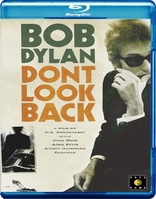
Movie rating
8 | / 10 |
Blu-ray rating
| Users | 0.0 | |
| Reviewer | 4.5 | |
| Overall | 4.5 |
Overview
Bob Dylan: Don't Look Back (1967)
When acclaimed documentary filmmaker D.A. Pennebaker filmed Bob Dylan during a three-week concert tour of England in the spring of 1965, he had no idea he was about to lens one of the 1960s most iconic feature films. Wanting to make more than just a concert film, Pennebaker decided to seek out both the public and private Bob Dylan. With unobtrusive equipment and rare access to the elusive performer, he achieved a fly-on-the-wall view of one of the most influential musicians of any era -- and redefined filmmaking along the way.
Starring: Bob Dylan, Albert Grossman, Joan Báez, Allen Ginsberg, DonovanDirector: D.A. Pennebaker
| Music | Uncertain |
| Documentary | Uncertain |
Specifications
Video
Video codec: MPEG-4 AVC
Video resolution: 1080p
Aspect ratio: 1.33:1
Original aspect ratio: 1.37:1
Audio
English: DTS-HD Master Audio 2.0
Subtitles
English, French, Spanish
Discs
25GB Blu-ray Disc
Two-disc set (1 BD, 1 DVD)
Playback
Region A, B (C untested)
Review
Rating summary
| Movie | 4.5 | |
| Video | 3.0 | |
| Audio | 4.0 | |
| Extras | 4.0 | |
| Overall | 4.5 |
Bob Dylan: Don't Look Back Blu-ray Movie Review
Portrait of the artist as a young punk.
Reviewed by Jeffrey Kauffman April 9, 2011A note to you obsessive-compulsive grammarians (and you know who you are): Don't Look Back was originally released without the apostrophe in Don't in its title. To make reading clearer here, I follow the more accepted custom of including the apostrophe in the contraction.
The name D.A. Pennebaker may not reside in the same starry galaxy as, say, Howard Hawks or William Wyler or Alfred Hitchcock or Stanley Kubrick, or in fact any number of famous directors whose names have entered the public lexicon in ways the directors themselves might have been surprised to realize. And yet Pennebaker has made some inimitable contributions to film, albeit in the relatively insular world of the documentary. His multi-decade career has seen him directing an amazing variety of documentaries, many with a musical slant. Pennebaker was one of the first documentarians to exploit what has perhaps been inaccurately termed cinema vérité, something which Pennebaker himself admits is largely an illusion. That feeling of “real life” may permeate his groundbreaking and iconic account of Bob Dylan’s 1965 United Kingdom tour (released in 1967), but as soon becomes clear to any astute viewer watching Don’t Look Back, there’s more than a hint of artifice to everything that is supposedly captured, fly on the wall style, by Pennbaker and his crew. That artifice is more or less admitted to by Pennebaker himself in the commentary accompanying this new Blu-ray release, where the director makes no bones about Bob Dylan being only too aware that he was being followed around by a film crew, and that his every action would be preserved, for better or worse, for posterity. That makes the final product that is Don’t Look Back all the more amazing, for Dylan often comes off in this documentary as a petulant little brat, a glowering presence who demeans reporters (including some kids), screams and yells at his entourage, and pretty much ignores the incredibly winsome Joan Baez, with whom he was in the closing days of a long romantic involvement. Ho-hum, just another day or two in the life of a musical legend and superstar.
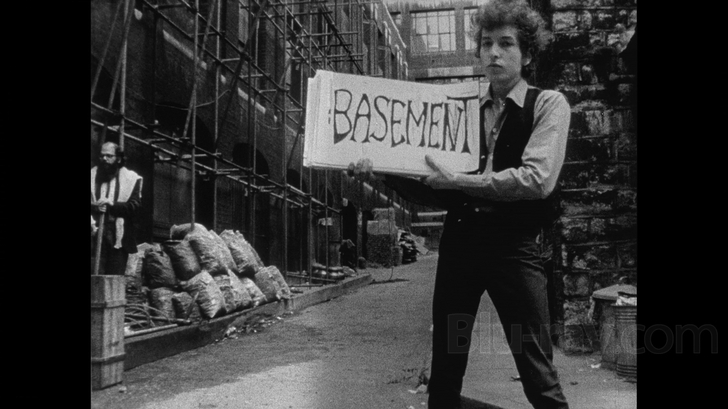
Though Pennebaker’s name may not in fact have entered the public lexicon, there’s little doubt that Don’t Look Back’s opening sequence has. It’s the now iconic proto-music video of Dylan standing in an alleyway discarding a series of cue cards which feature occasional words from his lyric to “Subterranean Homesick Blues” (and lest you be confused, yes, there is a long stretch where the cue cards contain words not found in the lyric, a sort of inside joke). While this now famous piece of video may be nothing other than a sort of prank, it actually may reveal something deeper about Dylan’s state of mind at the time, something which becomes increasingly clear as Don’t Look Back details what may be Dylan’s increasing consciousness of how much his success was actually trapping him. “Subterranean Homesick Blues” features the alarming imagery of Dylan actually throwing away his work, if you think about it. It may not have been Dylan’s, or in fact Pennebaker’s, intention, and yet it raises the intriguing question of how Dylan himself saw his increasing international presence in those halcyon days of 1965. In fact when he arrives in England and is asked by a reporter at the airport why he’s so much bigger now than he was a couple of years earlier, Dylan shrugs it off and claims not to know what the reporter’s talking about. The footage captured on Don’t Look Back argues rather persuasively otherwise. This is a young musician only too aware of what he’s become, and that awareness is frankly not all that flattering to Dylan a lot of the time.
What becomes only too apparent is that Dylan is simultaneously self-absorbed, gobbling up every last news item on himself he can get his hands on, while also strangely dismissive of others, both famous (Donovan, whose presence becomes sort of a running gag in this piece, as well as Dominic Behan, Brendan’s brother, whom Dylan won’t even consider meeting) and not famous (a series of reporters whom Dylan plays with like a cat with a mouse). Dylan comes off as boorish, bullying and the polar opposite of the “Everyman” his music made him out to be in those mid-1960’s days when folk and rock were melding into a new genre in which Dylan himself was seen as the progenitor. To be fair, however, it’s also completely apparent how trapped Dylan felt by the overwhelming success he had experienced. You can see it in the doleful eyes that peek out underneath his brat-like façade as he performs “The Times, They Are A-Changing” over and over and over. This is a young man who quite obviously wants to escape, but at the same time doesn’t want to give up the trappings of a celebrity superstar. This is also not to say Dylan is uniformly rude to everyone around him; on the contrary, he's really rather surprisingly solicitous to several young fans and seems genuinely interested in what they think of his music.
As awful as Dylan seems to be throughout Don’t Look Back, he’s matched tit for tat by his manager, Albert Grossman, who is seen in an alternately horrifying and hilarious segment “negotiating” with Granada and the BBC for “exclusive” television rights to a Dylan performance. Watching the down and dirty Grossman interact with the elegant and always deferential British is an alarming display of the differences between British and American etiquette, but it’s a bracing primer on what managers do for their clients. Grossman wants to get Dylan every last penny he can (which is only understandable), but he steamrolls through a series of phone calls and personal interactions that may leave some viewers feeling like they’ve witnessed a pretty unseemly display of “professional” behavior.
Throughout the fascinating array of backstage, “private” footage (if anything which includes a coterie of hangers-on can be termed private), and viscerally exciting on stage performances, Don’t Look Back captures a very unique and special time not only in Dylan’s life, but also in the wider universe of what was happening to music generally in those days. It’s incredible to see Dylan and Baez at this still relatively early stage of either of their careers, and what’s even more incredible is seeing the difference in temperament between the volatile and often almost offensively rude Dylan and the sweet, unassuming and self-effacing Baez. It’s not hard to see, actually, why their relationship didn’t flourish, romantically at least.
As with every great documentary, the subject here may not always be appealing, to say the least. And while Pennebaker points out the all too obvious fact that Dylan is “on” every time the camera rolls, that very “on”-ness reveals as much about Dylan the man and the artist as his music does, in fact, perhaps more so. An artist can craft his message carefully in a lyric or in a melody, but even “pretending” moment by moment for a camera often reveals unintended, perhaps subconscious, tendencies that can’t be manipulated as artfully as the changes in a 32 bar song. Dylan himself gets into a fairly hilarious (and ultimately futile) argument with a reporter about what the “truth” is, something which Dylan can’t even support beyond a mini-tirade. Though the truth here may in fact be laced with a certain amount of artifice, Don’t Look Back is one of the most bracingly truthful looks behind the star making machinery, at least insofar as it existed in the mid-1960’s. Dylan was both a victim and a victimizer of that very machinery, and Don’t Look Back captures that strange dialectic in all its slightly disturbing glory.
Bob Dylan: Don't Look Back Blu-ray Movie, Video Quality 
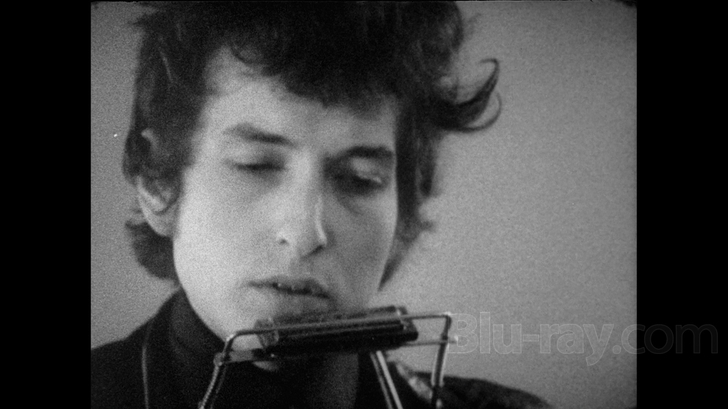
Don't Look Back was filmed on the fly with 16mm handheld cameras (an early use of the still bulky "portable" cameras of those days), so don't expect high definition wonderment from this AVC encoded 1080p transfer in 1.33:1. On the whole, though, Don't Look Back looks at the very least decent, if oftentimes the image is hobbled by inconsistent (and frequently inadequate) contrast. Black levels never are overtly milky, and are in fact rather richly "oily" a lot of the time, but the poor contrast makes a lot of shots suffer from rather bad crush and murkiness. Grain is more than abundant and gives several low contrast sequences a noisy ambience. None of this should really scare you off, however. The image is reasonably well defined and in the outdoor and brightly lit sequences, it looks rather good, considering its 16mm source elements and its age. The print, while showing occasional dirt, flecks and other debris, is in noticeably better shape than the at times pretty badly damaged one for 65 Revisited. Considering the historical importance of this documentary, no one should be too horribly disappointed with Don't Look Back's acceptable image quality.
Bob Dylan: Don't Look Back Blu-ray Movie, Audio Quality 
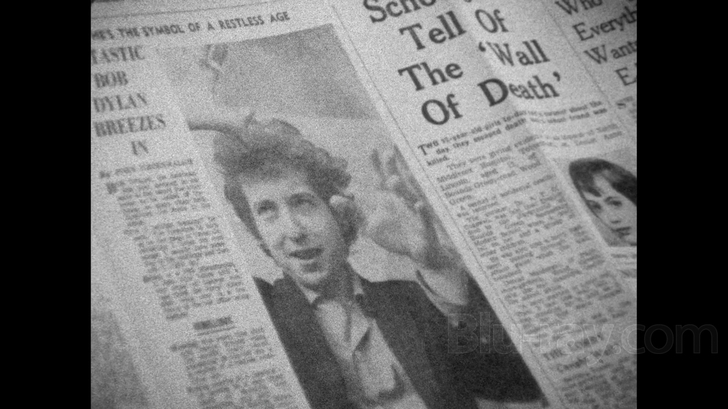
Much better than the image quality is the excellent, if narrow, DTS-HD Master Audio 2.0 mix accompanying this film. The narrow soundfield means that some of the crowded spoken scenes can sound confusing and muddled at times, but that's a passing qualm. What's great about this lossless track is its excellent fidelity in reproducing some wonderful early Dylan performances. While the original recording methods probably left a lot to be desired, there's a rather surprising lack of hiss and tinniness in any of these performances, save for the rinky-dink upright piano which Dylan pounds on a time or two. Dylan's guitar rings out loud and clear and his voice, though as "mumbly" as always, also sounds clear and well defined. This isn't a state of the art soundtrack by any stretch of the imagination, but it's a really well done lossless reproduction of a vintage track that is most likely going to delight most Dylan fans.
Bob Dylan: Don't Look Back Blu-ray Movie, Special Features and Extras 
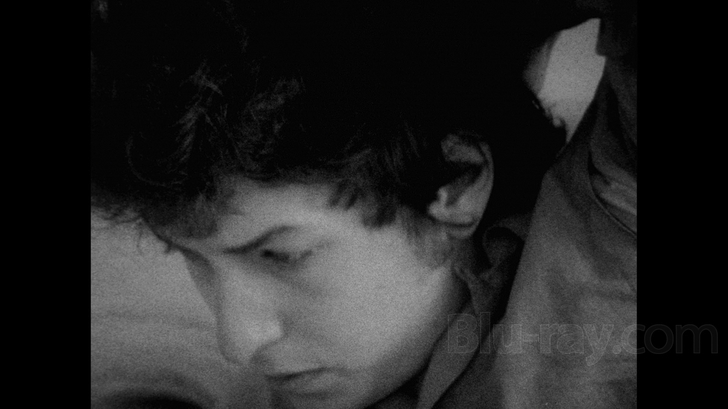
Don't be misled by thinking you're only getting a DVD version of Don't Look Back included with this Blu-ray. As discussed below, there's actually an entirely different bonus feature on the DVD.
The Blu-ray supplements include:
- Commentary with D.A. Pennebaker and Bob Neuwirth, is one of the best all around commentaries you're likely to hear on this or any film. Neuwirth was Dylan's road manager for the UK tour, and he appears throughout Don't Look Now. Pennebaker and Neuwirth discuss a host of really interesting information, helping to fill in some informational gaps the film never really makes clear, and providing a wealth of background on what was going on in front of and behind the cameras.
- Greil Marcus interview with D.A. Pennebaker (1080i; 17:48) is a really interesting chat between the critic, whom Pennebaker obviously respects immensely, and the filmmaker. Marcus is perhaps a bit too deferential about Dylan, but they go into a lot of interesting anecdotes about Don't Look Back and that entire era of Dylan's life.
- Subterranean Homesick Blues Alternate Take (SD; 2:20) finds Dylan in a park this time, an unable to keep up with discarding the cue cards in time.
- Audio Only Tracks (28:35), in lossless DTS-HD Master Audio 2.0, offers recordings of "To Ramona," "The Lonesome Death of Hattie Carroll," "Love Minus Zero/No Limit," "It Ain't Me, Babe," and "It's All Over Now, Baby Blue," recorded over a few days in May 1965 at various performances. Listen to Dylan slightly freak out when he discovers his guitar is out of tune before he launches into "It's All Over Now, Baby Blue."
Bob Dylan: Don't Look Back Blu-ray Movie, Overall Score and Recommendation 
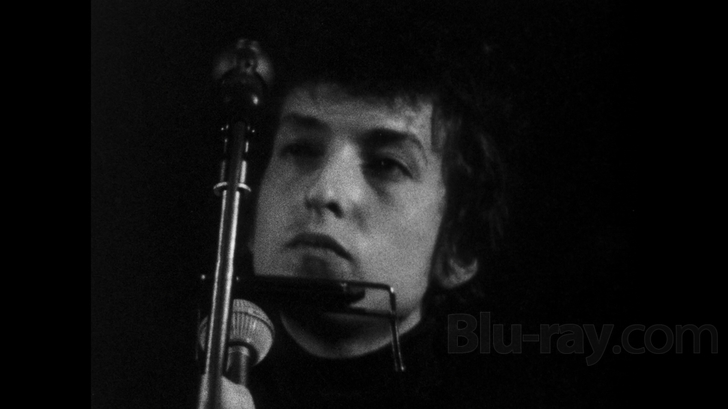
Don't Look Back is one of the most insightful documentaries ever made about a music superstar, albeit perhaps unintentionally so, at least from Dylan's perspective. Filled with incredible behind the scenes footage as well as at least snippets of several live performances, this is a groundbreaking piece of documentary filmmaking that should be seen by anyone with even a passing interest in Dylan and this era of popular music. Highly recommended.
Similar titles
Similar titles you might also like

Monterey Pop
Remastered
1968

No Direction Home: Bob Dylan
Deluxe 10th Anniversary Edition
2005

Gimme Shelter
Uncensored 30th Anniversary Version
1970

Rolling Thunder Revue: A Bob Dylan Story by Martin Scorsese
2019

The Last Waltz
1978

Stop Making Sense
1984

Jimi Plays Monterey & Shake! Otis at Monterey
1986-1987

Sympathy for the Devil
One Plus One / The Rolling Stones
1968

Buena Vista Social Club
1999

Moonage Daydream 4K
2022

A Poem Is a Naked Person
1974

Roger Waters: The Wall
2014

Jazz on a Summer's Day
1959

Naqoyqatsi
2002

Powaqqatsi
1988

Koyaanisqatsi
Theatrical and Demo Versions
1982

My Generation
2017

The Stone Roses: Made of Stone
2013

20,000 Days on Earth
2014

Cameraperson
2016
